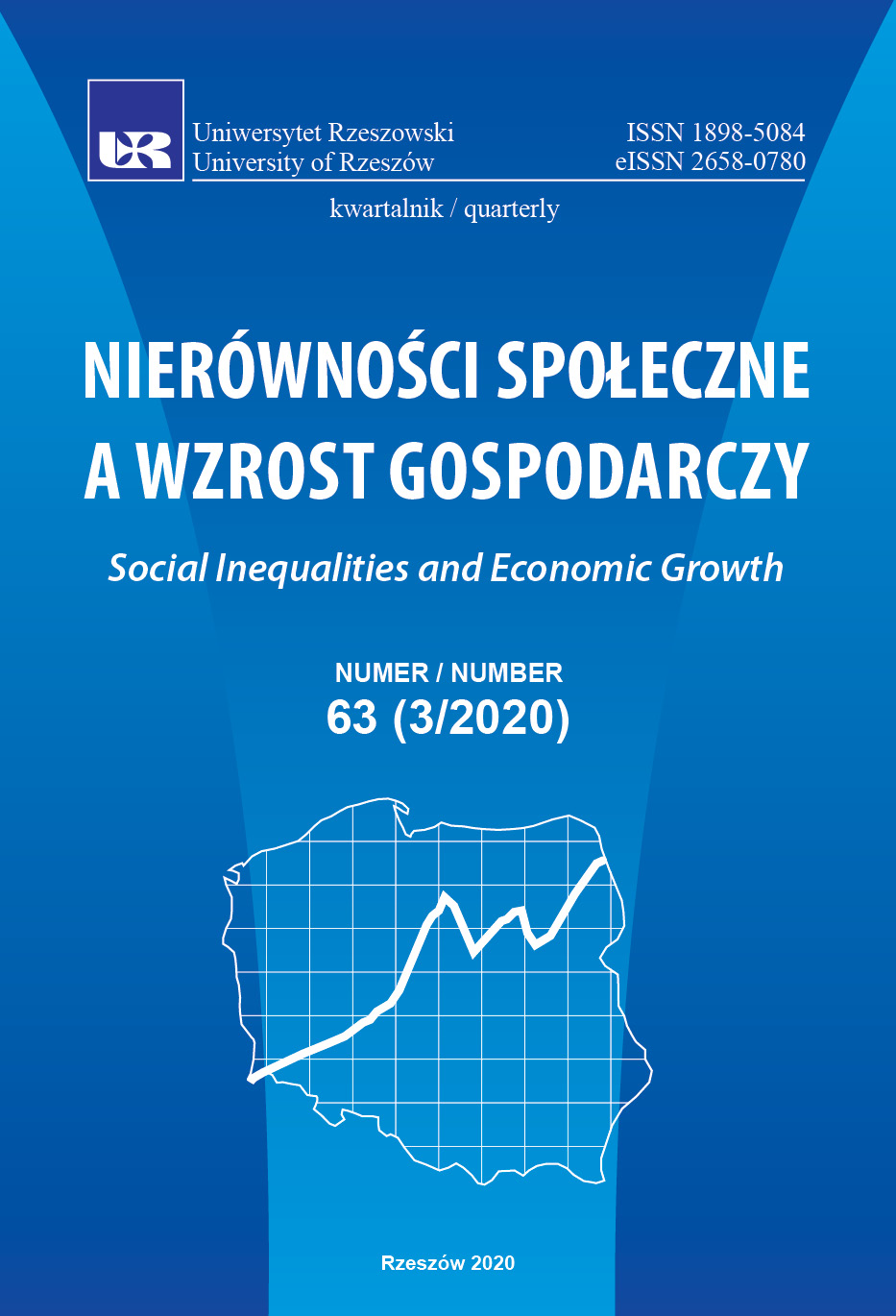Knowledge spillovers and innovation: analysis of the relationships between service centres and MSMEs from the regional perspective
DOI:
https://doi.org/10.15584/nsawg.2020.3.14Keywords:
innovativeness, service centres, knowledge spillover, MSME, regionAbstract
The innovativeness of micro, small and medium-sized enterprises (MSMEs) is dependent on accessibility to appropriate knowledge resources that enable creation of new market offers. Due to inherent limitations related to the possibilities of investing in the acquisition or creation of new knowledge, smaller entities may benefit from the proximity of large companies, especially multi-national corporations, which are actively involved in new knowledge creation, and this knowledge has the ability to spill over. The flow of knowledge from service centres to local smaller companies has the potential to stimulate innovativeness in regional service functions, creating opportunities for local entrepreneurs to develop and grow. Hence, the purpose of the considerations presented in this paper is to analyse the impact of the flow of knowledge from service centres to MSMEs as a result of interactions between them. For this purpose, empirical data from quantitative research carried out by the research team in 2016 on a representative sample of 1,100 micro small and medium-sized enterprises in the Zachodnio-pomorskie (West Pomerania) voivodeship were used. The analysis shows that service centres can have a positive impact on the innovativeness of companies in the regions in which they are located, provided that there is a flow of knowledge as a result of direct transfer or personal interactions.
Downloads
References
Acs, Z. J., Braunerhjelm, P., Audretsch, D. B., Carlsson, B. (2009). The knowledge spillover theory of entrepreneurship. Small Business Economy, 32, 15–30. DOI: 10.1007/s11187-008-9157-3.
Arrow, K. (1962). The economic implications of learning by doing. The Review of Economic Studies, 29(3), 155–173. DOI: 10.2307/2295952.
Altenburg, T. (2000). Linkages and spillovers between Transnational Corporations and Small and Medium-Sized Enterprises in Developing Countries – Opportunities and Policies. The UNCTAD (Ed.) MNC-SME Linkages for Development. Issues – experiences – best practices. Proceedings of the Special Round on MNCs, SMEs and Development. February 15, 3–61, Bangkok, United Nations. Geneva: UNCTAD X.,
Baruk, J. (2016). The Role of Knowledge in the Processes of Creating and Implementing Innovations. Marketing Instytucji Naukowych i Badawczych, 21(3), 79–104. DOI: 10.14611/minib.21.09.2016.10.
Bayar, Y. (2017). Greenfield and Brownfield Investments and Economic Growth: Evidence from Central and Eastern European Union Countries. Naše Gospodarstvo / Our Economy, 63(3), 19–26. DOI: 10.1515/ngoe-2017-0015.
Blomstrom, M., Kokko, A. (1997). The Impact of Foreign Investment on Host Countries: A Review of the Empirical Evidence. World Bank Policy Research Working Paper No. 1745. New York: World Bank.
Dunning, J. H. (1988). The Eclectic Paradigm of International Production: A Restatement and Some Possible Extensions. Journal of International Business Studies, 19(1), 1–31. DOI: 10.1057/palgrave.jibs.8490372.
Hansen, M. W., Schaumburg-Müller, H. (Eds.) (2006). Transnational Corporations and Local Firms in Developing Countries – Linkages and Upgrading. Copenhagen: Copenhagen Business School Press.
Hirschman, A. O. (1958). The Strategy of Economic Development. New Haven: Yale University Press.
Łobacz, K. (2018). Innovating and growing service-based entrepreneurial businesses – development model based on European and Asian case studies. European Journal of Service Management, 4(28/2), 231–238. DOI: 10.18276/ejsm.2018.28/2-29.
MacDougall, G. D. A. (1960). The Benefits and Costs of Private Investment from Abroad: A Theoretical Approach. Economic Record, 36(73), 13–35. DOI: 10.1111/j.1475-4932.1960.tb00491.x.
Navaretti, G. B., Venables, A. J. (2004). Multinational Firms in the World Economy. Princeton: Princeton University Press.
Niedzielski, P., Łobacz, K. (Eds.). (2017). Centra Usług w układach regionalnych. Szczecin: Wydawnictwo Naukowe Uniwersytetu Szczecińskiego.
Piłat, M. (2016). How Organizational Culture Influences Building a Learning Organization. Forum Scientiae Oeconomia, 4(1), 83–92.
Romer, P. (1986). Increasing returns and long-run growth. Journal of Political Economy, 94(5), 1002–1037.
Rugraff, E., Hansen, M. W. (2011). Multinational corporations and local firms in emerging economies. An Introduction. In: E. Rugraff, M. W. Hansen (Eds.), Multinational Corporations and Local Firms in Emerging Economies (pp. 13–37). Amsterdam: University Press.
Sass, M. (2011). The impact of foreign direct investment in business services on the local economy. The case of Hungary. In: E. Rugraff, M. W. Hansen (Eds.), Multinational Corporations and Local Firms in Emerging Economies (pp. 51–69). Amsterdam: University Press.
Scott-Kennel, J., Enderwick, P. (2005). FDI and Inter-Firm Linkages: Exploring the Black Box of the Investment Development Path. Transnational Corporations, 14(1), 13–23.
Downloads
Published
How to Cite
Issue
Section
License
Copyright (c) 2020 University of Rzeszow

This work is licensed under a Creative Commons Attribution-ShareAlike 4.0 International License.


